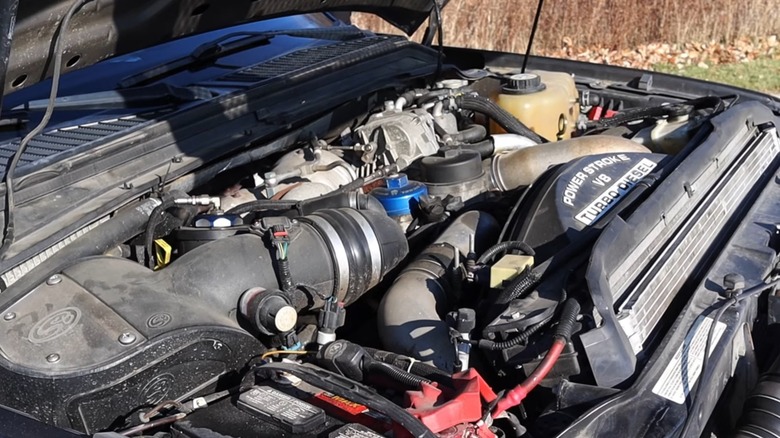These Are The Ford 6.4 Power Stroke Years You Should Avoid
There are legendary powerplants within the automotive sphere that are known to be the most reliable diesel engines ever built, like the Ford 6.7-liter Power Stroke. In fact, with over three decades under its belt, there are many notable examples of the most reliable Ford Power Stroke diesels ever made. However, the 6.4 version isn't one of the automaker's finer moments. In fact, there was a span of around 10 years beginning in the early 2000s, where Ford introduced and then shortly phased out a total of two diesel Power Stroke variants, the 6.0 and the 6.4.
The 6.4-liter version of the Power Stroke had a short production life, that lasted from 2007 to 2010. There were distinct differences between the 6.4 and the earlier 6.0, but unfortunately, the short-lived 6.4 Power Stroke carried over some of its predecessor's questionable design choices. The common problems with Ford's 6.4L Power Stroke diesel engine resulted in a replacement 6.7-liter diesel in 2011, which was better received.
Despite its complaints, the 6.4-liter Power Stroke features twin turbochargers and high-pressure common rail fuel injection, which results in 650 lb-ft of torque at peak. For the few years that the 6.4 was available, it's first production year in 2008 is considered the worst.
Why the 2008 6.4L Power Stroke is considered the worst
The first year of a new engine can be a rough road for automakers to navigate. In terms of the 2008 6.4 Power Stroke, it suffered heavily due to its emission systems, which aren't cheap to replace. The most infamous issues had to with the DPF or diesel particulate filter, which captures particles of soot, preventing them from exhausting out of the truck and into the air.
Many complained the 6.4 Power Stroke in 2008 offered terrible fuel economy. Based on owner reports on Fuelly.com, the 2008 Ford F-350s highest average mileage figure is only 12 miles to the gallon. One of the major sources of gas guzzling was the DPF, which requires additional fuel to clean its filter during the regeneration cycle. Apparently, each time the DPF undergoes a regeneration cycle, fuel economy numbers lower, meaning the problem continues to get worse. As a result, inquiries concerning what it means to delete a diesel truck sprang up; however, deleting a diesel is a bad idea and best avoided.
Another widely reported problem is oil dilution. Oil dilution occurs when unburnt fuel mixes in with oil. Unfortunately, with the 2008 6.4 Power Stroke, it also stems from the DPF system. The engine uses a post-injection approach, where diesel is dispersed during the conclusion of the exhaust stroke for DPF regeneration. However, this particular iteration of the Power Stroke struggled with leftover and unburned fuel combining with the oil which could lead to catastrophic engine failure.

